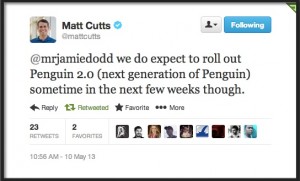Penguin 2.0: Get your house in order
Update May 23, 2013
Penguin 2.0 launched yesterday afternoon, May 22, and the update is now complete. According to Cutts, “It’s gonna have a pretty big impact on web spam,” Cutts said on the show. “It’s a brand new generation of algorithms. The previous iteration of Penguin would essentially only look at the home page of a site. The newer generation of Penguin goes much deeper and has a really big impact in certain small areas.”
Let us know if you’re seeing your SERPs change — we’re watching!
Over the past two weeks, several clients have asked us about Google’s Penguin 2.0 updates, which are coming. Soon.
The first Penguin update launched in April 2012. Refreshes followed in May and October. It was only a matter of time until the next, and on May 10 Google’s Matt Cutts confirmed the algorithm changes:

In the first incarnation of Penguin, websites hit hardest were those with too much exact-match anchor text and skeezy, unnatural links. The update, which is a link-quality filter that sits atop Google’s core algorithm, had massive impacts on SERPs. Google devalued sites with “bad neighborhood” link clusters. At heart it was a crackdown on over-optimization. You try to manipulate the system? Google rains down with great vengeance and furious anger.

How’s this one different? I’m not sure yet. My first instinct was that Penguin 2.0 was a tightening up of the original update. That doesn’t feel right, based on Matt’s tweet that reads: “…might want to downgrade previous Penguin 2 and 3 to Penguin 1.1 and 1.2. Upcoming release is the true 2.0.” Big hits will most likely be on: advertorials, spam queries, link networks, and domain clusters. That’s my best guess.
Listen:
What should you do? Nothing, if you’ve played it clean. If you’re creating high-quality content when you’re writing and designing web pages, you’re going to be fine. Grab a beer, pop some corn, and watch the forums light up with panicked SEOs and disgruntled webmasters. But if you’ve built spammy links and over optimized, it’s time to get your house in order. Look at Cognitive SEO or Link Research Tools to classify links, or get in touch with an agency that can help (yes, we can help).
Here’s the secret: There’s no secret. There’s no way to game the system – for long. Let’s say you get away with gaming and you’re pulling some wicked rankings. So what? You get irrelevant, non-converting traffic. How is that a win? What you can do, should do, need to do is both incredibly simple and incredibly difficult: Create good content. Stop thinking about SEO and start thinking of providing your audience with content they want to read. Be smart, thoughtful, and authoritative. From the horse’s mouth:
“We have also been working on a lot of ways to help regular webmasters. We’re doing a better job of detecting when someone is more of an authority on a specific space. You know, it could be medical. It could be travel. Whatever. And try to make sure that those rank a little more highly if you’re some sort of authority or a site, according to the algorithms, we think might be a little more appropriate for users.” – Matt Cutts
Read more:
WebProNews
Search Engine Land
Sara Fraser – Director of Business Development



